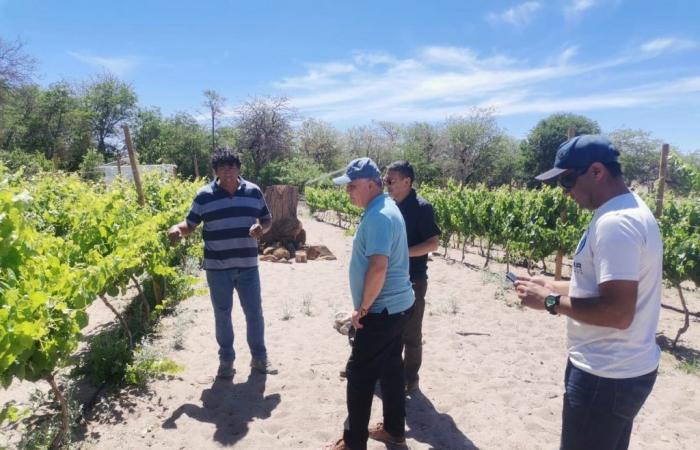
Advice and collaborative work aimed at improving the processes of the “Lickanantay” peasant cooperative in the town of Toconao, developed by students from the Faculty of Economics and Administration (FACEA) of the Universidad Católica del Norte (UCN), in an initiative carried out under the Learning plus Service (A+S) methodology.
The activity includes visits and support to the agricultural cooperative, located in the commune of San Pedro de Atacama, Antofagasta region, which brings together high-altitude wine growers dedicated to the production and marketing of high-quality wines, from the Ayllu brand, produced between 2300 and 2400 meters above sea level, in the middle of the aridity of the Atacama Desert.
The work implemented by the students of the Internal Control course, of the Accountant Auditor-Public Accountant degree, includes collection of information and a diagnosis of the internal control systems in the transactional cycles of the cooperative: cash and bank, accounts collect, accounts payable, production, and sales and merchandise, among others. Subsequently, an internal control system is designed for each cycle, and finally the evaluation of these is carried out to issue an internal control letter to the management of the cooperative.
This collaborative work, which has the backing and support of the AcuyMinAgro project, considered meetings and exchange of information between collaborators, students and the academic team participating in the initiative.

COLLABORATIVE WORK
“I value the integration of different faculties and departments in this project in accordance with the different requirements that arise when working with a community“, stressed the academic of the Faculty of Marine Sciences of the UCN and director of the AcuyMinAgro Project, Luis Pereira, when referring to the initiative.
A similar opinion was expressed by the academic and director of the Department of Audit, Accounting and Management Control of the FACEA, Lissete Sánchez, when highlighting the motivating experience that the third-year students of the Accounting Auditor-Public Accountant degree had, relate to communities through the Learning More Service (A+S) methodology, thus favoring their training process. “It has allowed them to interact directly with the community, to feel that companies are really exposed to situations where they can intervene, applying in this case procedures to design an internal control system appropriate to the Lickanantay cooperative.“, specific.
He added that the experience, in addition to being motivating, considered teamwork and was relevant in terms of the delivery of knowledge and practical activities. They had the opportunity to interview the manager and the board of directors, and obtain information that allowed them to analyze and make a diagnosis of how the cooperative works financially, and in this way contribute to its improvement, functioning and operability.
“LICKANANTAY”
The general manager of the “Lickanantay” peasant cooperative, Wilfredo Cruz, highlighted the capabilities and production of the agricultural entity that brings together different cooperative members around the Salar de Atacama. “We produce about 20 tons of grapes, and approximately 12,000 bottles of wine per year. This is a niche, unique product that only the desert can provide.”, he emphasized.
The manager added that, within this cooperative model, they are proud and constantly growing, drawing on the best knowledge in the region. In this context, he highlighted the agreement with the UCN, which has made it possible to carry out an audit and improve processes. “We are very grateful to be able to have this connection with the University, which is an entity called to innovate and improve the development environment of the region.”he declared.
Another vision was expressed by the third year student of the Accounting Auditor-Public Accountant program, Cristina Burgos, who is part of the group of students that participates in the advisory work, who highlighted the importance of the activity in her process of vocational training: “It gave us an enriching experience, since it not only allowed us to know about its activities and internal processes, but we also got to know the collaborators and workers closely.”.
The young woman explained that working with that community offered them a more complete vision of how the different areas work and how they connect with each other. “This practical approach was essential to identify areas of improvement and apply effective solutions, using our knowledge of internal control.”, he concluded.











